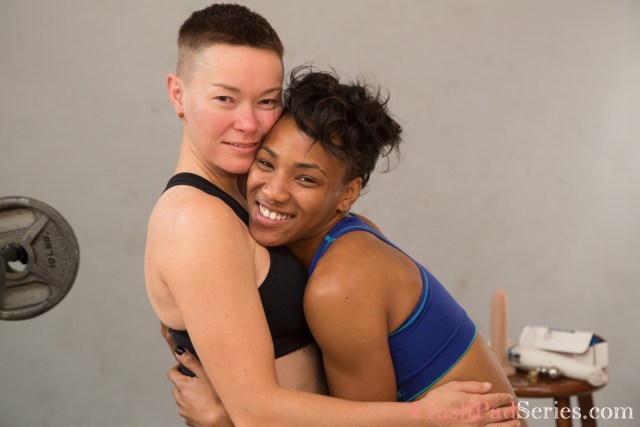Feature of Valentine and Calico in Crash Pad Series episode 232. All of the photographs in this NSFW Sunday come from CrashPadSeries.com. The inclusion of a photograph here should not be interpreted as an assertion of the model’s gender identity or sexual orientation. If you’re a photographer or model and think your work would be a good fit for NSFW Sunday, please email carolyn at autostraddle dot com.
Welcome to NSFW Sunday! It’s the most wonderful time of the year, by which I mean the time of the year where everyone spent two weeks publishing sex and dating content non-stop and then I had to write a link roundup.

+ “Sex rules, but let’s not pretend it’s getting any immigrants out of detention.” At the Cut, Katie Heaney argues that while queer sex is resistance, it’s not enough resistance:
“Simple acts of queer visibility and community do matter. Coming out matters. Loving and taking care of ourselves and each other matters, and queer sex can absolutely play a part in that love and care. But actually, physically showing up for our community — especially by those of us who are more privileged, especially on behalf of those who are most at risk, our trans and black and Latinx and Muslim queer brothers and sisters — that matters too, now more than ever.”
+ But also, argues adrienne maree brown at Bitch:
“Audre Lorde taught us that caring for ourselves is ‘not self-indulgence, it is an act of political resistance,’ and although we know how to meme and tweet those words, living into them is harder. We have a deeper socialization to overcome, one that tells us that most of us don’t matter — our health, our votes, our work, our safety, our families, our lives don’t matter — not as much as those of white men. We need to learn how to practice love such that care — for ourselves and others — is understood as political resistance and cultivating resilience.”
+ Here’s how to love each astrological sign (remember to consider Venus signs as well as sun signs). And here’s how to do love spells, for your reference.
+ Here’s a very simple overview of BDSM just for you.
+ How do you find a perfect socially aware unicorn of your very own?
+ “Youths, abandoning heterosexuality, flee to internet.”

+ Lingerie ads have capitalized on fetishized images of queer sexuality since the 1920s, but rarely try to appeal to actual queer women:
“Women’s eroticism toward each other is acceptable if a male gaze is present. It is through this gaze that women’s sexuality, women’s queerness, becomes pornographic titillation rather than a genuine expression of desire. For this reason, these ads are exploitative — particularly because the brands that are engaging in homoerotic advertising (and the ones that aren’t, for that matter) have thus far expressed little to no interest in actually showing queer women or respectful representations of queer desire in ad campaigns.
As a queer woman, these ads tell me I can exist — to a point. My sexuality is real, as long as it’s been stripped down so hard it’s not even lesbianism. […]
Queer women, in short, are shut out of these images entirely.”

“If you don’t want to flirt with strangers in real life, the only other option is to flirt with them online, and that’s not much better. Until recently, online dating was relentlessly heteronormative, with only two gender options. Trans people were forced to out themselves in the first lines of their biographies or risk being called liars or frauds, still a common occurrence on apps like OKCupid and Tinder, which aren’t fully equipped to accommodate trans identities; Tinder, for instance, allows trans people to identify as male or female for the purposes of search results, but has no idea how to accommodate nonbinary people.”
+ In a study of “evilly satisfying” Tinder, social psychologist Jeanette Purvis found that “swiping may reflect more about our cognitive shortcuts than our more nuanced romantic desires”:
“While I found no statistical difference between Tinder users and the other two groups in regards to desired relationship length and likelihood to have sex on the first date, Tinder users did report experiencing frustration with their romantic encounters. Tinder users were more likely to report being deceived by romantic partners met through the app, and they had lower overall satisfaction with their last ‘first date’ than the other two groups. In other words, motivations for using Tinder may not be as different as we thought, but the outcomes suggest the fun users have while swiping may not always translate to the same kind of enjoyable experiences in real-world settings.”

+ The fact that Tinder is swiping-, photo- and location-based (and maybe a little sleazy) is the thing that its competitors are counting on. For instance, some apps like Her give profiles sightly more nuance, which could be an edge, I guess:
“To set themselves apart from Tinder, emerging dating apps are also offering users more ways to describe themselves than just the usual — photos, age, sexual orientation, and a bio. Her, a dating app for LGBTQ women that launched in 2013 and now has 1.5 million users globally, offers those profile options plus more. For instance, it gives 14 options for sexual orientation, 25 for gender, and seven for relationship status.”
Note that in a private investigation conducted by vapid fluff editor and all-around hero Stef Schwartz, we discovered that Robyn Exton, Her founder, is on Tinder. To continue: “‘The swiping interaction is fun, but when you apply that to people, you’re reducing people to objects. Whether it’s shoes or humans, you can do the same interaction: push them away or pull them closer,’ [Siren cofounder Susie Lee] said. ‘We want to fight this idea that you’re shopping for humans,’” reports Business Insider.
+ On the other hand: “Love is not a game. Tinder is.” At the New Inquiry, Alicia Eler and Eve Peyser write about how to win Tinder, arguing that the app is a perfect way to manage vulnerability and out yourself out there simultaneously, that dissonance barriers are necessary, that it is necessary to view everyone — including yourself — as an avatar and that rejection doesn’t exist unless you want it to:
“It is not that people on Tinder are all ‘players’ or trying to game the system governing hooking up. It’s that Tinder is a radically destabilizing networked social experiment. It is hyper-technosexual, it is disturbing, it is pleasurable, and it is highly addictive. You hit the app; you quit the app; you inevitably return. In Tinderland, you’re bombarded with so many faces, you seldom notice when somebody doesn’t swipe you back. Rejection doesn’t exist unless you want it to.









Comments
My problem with the app Her is trans women were being blocked for using the app because terf and terf aligned people were reporting trans woman. But, I recently read that the app conceded to trans men petitioning to use the app, super odd cause the app has an option to report people for being men(unless that option was taken down?). I stopped using it because someone reported me because I am amab trans, I assume, and the app required me to send in my state ID to use the app again. No, thank you.
*hugs Al*
Thank you friend!
You’re welcome, Al. I love you. :)
Wow. Not only is that quite an inappropriate invasion of privacy, but it effectively excludes any trans women who haven’t been able to change their ID for whatever reason. I’m sorry you had that experience.
That and it could allow an awful cis man access to harass lbtq folks since they can show their id and just say they are trans men.
That doesn’t happen does it?
Yeesh… that’s super messed up. I feel like Autostraddle could come up with a way better dating app that would bring queer dating into the 21st century.
Straddlr
The dating app for Autostraddle readers
Love it because it sounds like “straddle her”
don’t mind if I do!
I’m right now on my phone so I hope this link works. https://photos.google.com/share/AF1QipPNWS0txGKqNQyOlV5g52XUrjlMnCxrM-EvEFN35e14i7AMJQvp6xVQHkDhM1ahJQ/photo/AF1QipPIcyrREc7gh1MPqf_vWVup6Tiom1-6Rbd5qFr0?key=d09IeFE1UlpGMHJHRHY3bWNIYTU5UWJCeVVsN2tB
What?
TW mention of rape/paedophilia
Hm I’ve thought a bit about this fucking for resistence since the original article, at which point I was all about it. I’ve got more complicated opinions on it now.
The negative side of it is: not everyone is fucking. One community under the queer umbrella is asexual people. Pressurising them to feel like outsiders for not having sex is the opposite of what we should be doing. Also society as a whole has quite a bit of prejudice. It’s not always the nicest person who gets the sex. Sometimes it’s just the most conventionally attractive, popular, rich, non-disabled one. So people who want sex and who can’t access it shouldn’t be made to feel bad either.
Quality matters more than quantity here. And I don’t mean how good your technique is but how well you treat other people. One of the links on the original article (I didn’t spot it at first but someone on here did) linked to someone who believed in legalising all sex. Including paedophilia. In a rape culture there’s nothing radical about rape. In fact a rapists version of ‘as much sex as possible’ makes society massively worse than it would be if nobody raped.
I didn’t like his notion that fucking is more important than loving. The world needs more love. One way to express that is consensual sex. Which is radical when it’s between queer people in a homophobic environment.
I hate the pressure to show up physically. It’s ableist and I’ve read arguments on it being classist too, (though I can’t speak on this personally as a middle class person). There’s room for everyone to use their skills in the resistance. As long as someone does turn up at the physical protests those who can’t shouldn’t feel guilt.
One thing I think is radical is to find some space where you can be yourself more fully than before. If you’re in an environment where it’s physically/psychologically safe to do so, come out. Same about coming out on other things. And once you’re out don’t let them off that easy. If they’re talking about some cute guy they’ve met, feel free to talk about girls/non binary people. If their conversation is more r rated, don’t feel pressure to keep yours pg. Show all sides of yourself unless its physically/psychologically dangerous or gets in the way of your own boundaries.
And sometimes between two queer, sexual ppl that radical honesty will become the sort of flirting that leads consensually to the bedroom.
Well said. Like ugh, of course a cisguy would write about sex as if it’s all we need to change the world. Instead of like, our intersectionality and diversity and stuff being the source of strength of our resistance, now it’s acts of physical intimacy queer people may not want/need/seek. And there was room for the author to talk about just how being open about queer sex is important for AIDs activism and female liberation, but well he devotes barely a line to that. The whole article centered around a purely hypermasculine queerness with zero discussion of rape culture and/or the true spectrum of queer identity. Though I imagine the article might just come from a dated perspective of someone growing up in a more sexually repressive time, when in reality I think today we’ve swung toward sexually permissive to the point of shaming those who don’t engage.
Just wondering – are NSFW Sundays sponsored by crash pad now?
Sponsored posts are always flagged as sponsored posts; Crash Pad is a long-time Autostraddle affiliate and, as we work toward using only photos for which we have permission, its library has been a fantastic resource.
It’s just better to have permission!
Is the plan eventually to shift back to other imagery as well? The Crashpad ones are great but I do miss your previous roundups, they were so gorgeous. I can see how it would be far more time consuming though.
There’s a caption at the top of the article: “If you’re a photographer or model and think your work would be a good fit for NSFW Sunday, please email carolyn at autostraddle dot com.”
Jayogen’s arms could use their own instagram account, really
Can you pls. diversify the sources for your Sunday photos?
Hi I have just read your comments policy. So I am now wondering why comments by myself and two others regarding sources for photos were removed?